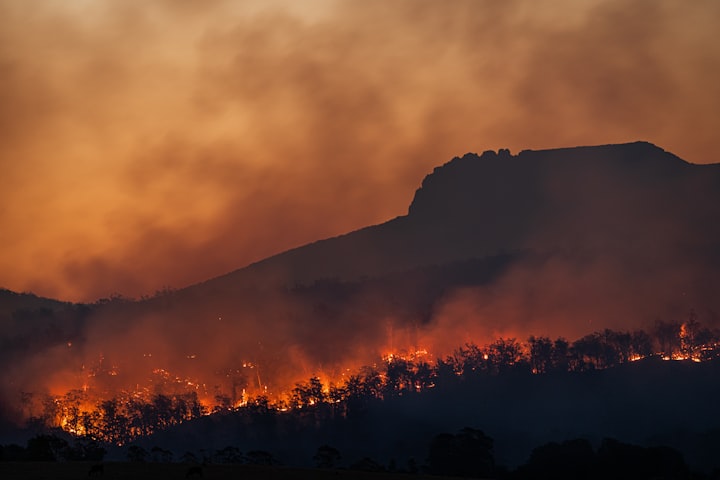Global greenhouse gas emissions set new records in 2023, driving 1.45°C of anthropogenic warming so far
We are doomed!

The Scorching Indictment of Our Time
The numbers are in, and they paint a damning portrait of our species' reckless disregard for the very planet that sustains us. Global greenhouse gas emissions reached new records in 2023, driving a staggering 1.45°C of anthropogenic warming so far. This is no mere statistic, but a clarion call that we have trespassed far beyond the bounds of reason and responsibility.
How dare we, the supposed crown jewel of creation, behave with such wanton abandon? Have we learned nothing from the harsh lessons of history, where civilizations have crumbled under the weight of their own excesses? This is not some distant, hypothetical calamity, but a real and present danger that threatens to engulf us all.
One need not be a scientist to grasp the gravity of this situation. The evidence is as clear as the scorching sun beating down upon us - we are hurtling towards an abyss of our own making. And yet, still, the engines of industry churn, the forests fall, and the oceans acidify, as if we have become immune to the cries of a planet in distress.
This is no time for equivocation or half-measures. The time for tepid incrementalism has long since passed. We must summon the courage to stare into the abyss and confront the truth, no matter how uncomfortable it may be. For if we do not, we risk becoming the architects of our own extinction, consigning future generations to a world that is all but uninhabitable.
Statistics that highlight the potential worst-case scenario for climate change:
RCP 8.5 Scenario: Experts refer to the worst-case climate change scenario as "RCP 8.5." In this scenario, global warming could exceed 4°C above pre-industrial levels by the year 2100. Emissions would continue to rise, leading to severe impacts
Extreme Heat: The visualization of this worst-case scenario depicts extreme heat worldwide. For instance, Phoenix, Arizona, which is already known for its heat, may experience up to 199 days per year with temperatures hitting at least 32°C by 2100 (compared to an average of 158 days during the 20th century)
Rising Sea Levels: The worst-case scenario also includes rising sea levels. Coastal areas are at risk of inundation, affecting millions of people and altering local climates
Forest Fires: Due to a phenomenon called the "moisture deficit," forested areas become more prone to fires. This scenario could lead to devastating wildfires similar to those witnessed recently in the western United States
Unmitigated Emissions: Imagine a world where no further efforts are made to control emissions beyond what was achieved in 2015. Such a scenario could result in more than 3°C of warming by 2050
Impacts on Biodiversity: The worst-case scenario threatens biodiversity, with many species facing extinction due to habitat loss, changing ecosystems, and extreme conditions
Water Scarcity: Rising temperatures exacerbate water scarcity, affecting agriculture, human health, and ecosystems
Displacement of Populations: Hundreds of millions of people may be forced to migrate due to extreme weather events, sea-level rise, and loss of habitable land
Economic Costs: The worst-case scenario would have significant economic costs, impacting infrastructure, agriculture, and livelihoods globally
Health Risks: Heatwaves, air pollution, and changing disease patterns pose health risks, especially for vulnerable populations
Countdown to Catastrophe: The Alarming Indicators of Ecological Collapse
As the climate crisis accelerates, the scientific evidence paints a dire picture of the future that awaits us if transformative action is not taken immediately. A review of the latest research reveals a cascade of interconnected threats that portend a potentially catastrophic unraveling of the global ecosphere.
Perhaps most alarming is the projection that 14–32% of macroscopic species could face climate-related extinction in the next 50 years, potentially wiping out up to 6 million animal and plant species. This staggering loss of biodiversity would unravel the delicate web of life that sustains human civilization.
Compounding this crisis, humanity has already exceeded several critical "planetary boundaries" that define a safe operating space, including in areas like climate change and biodiversity. We are now firmly in the "danger zone" where ecosystem collapse becomes increasingly likely.
The worst-case scenario paints an even more harrowing picture, with global warming potentially reaching 4.5°C by 2050 - a level that would make large swaths of the planet nearly uninhabitable for humans. This would trigger a cascade of effects, from the complete melting of the polar ice caps (leading to 65 meters of sea level rise) to mass extinctions exceeding even the Permian-Triassic event that wiped out 90–95% of species.
Equally alarming are the projections that extreme heat could become the norm, making agriculture impossible across huge regions, while ocean acidification and deoxygenation could devastate marine ecosystems. And the potential for feedback loops, like methane gas explosions and "hypercane" storms, could push the climate system into a state of runaway, uncontrollable change.
Tragically, the science indicates that current national climate plans are woefully insufficient to limit warming to the 1.5°C target pledged in the Paris Agreement. We are hurtling towards a future that may be, in the words of one expert, "worse than the worst-case scenario."





Comments
There are no comments for this story
Be the first to respond and start the conversation.